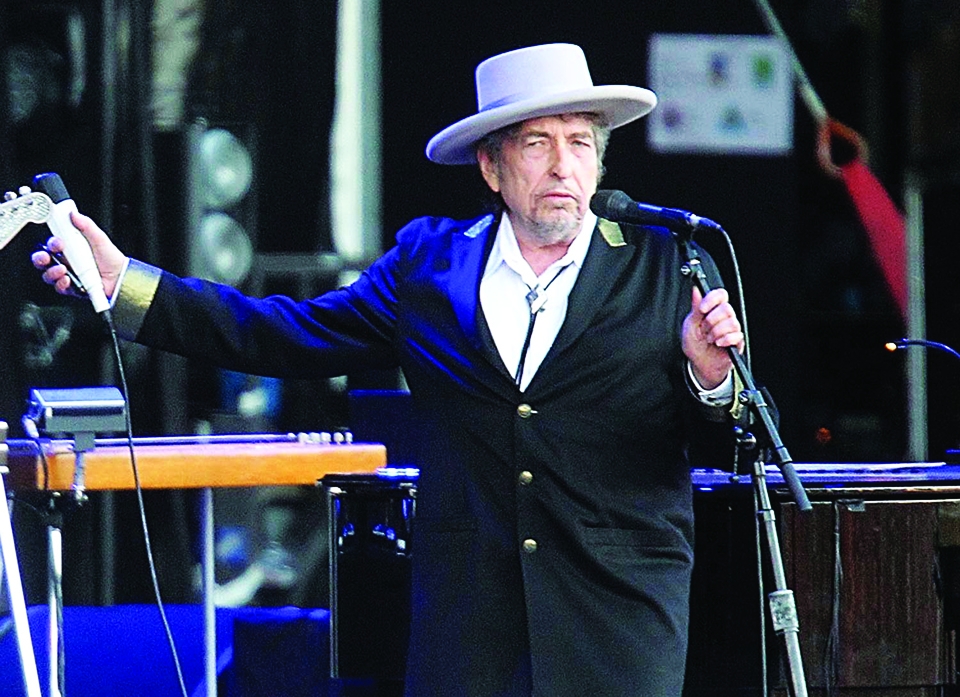

FILE – This July 22, 2012, file photo shows U.S. singer-songwriter Bob Dylan performing onstage at “Les Vieilles Charrues” Festival in Carhaix, western France. Dylan won the 2016 Nobel Prize in literature, announced Thursday, Oct. 13, 2016. (AP Photo/David Vincent, File)
By Charlie Megginson | Staff Columnist
Not since 1973 has an American won the Nobel Prize in literature. Almost every October since, Bob Dylan’s fans have called for the famed singer-songwriter to receive the prestigious award.
Finally, their wish has been granted.
On Oct. 13, The Nobel Foundation awarded the Nobel Prize in literature to the folk-rock lyricist and musician. The Swedish Academy, the organization charged with selecting the recipient for the prize in literature, noted that Dylan “[has] created new poetic expressions within the great American song tradition.” Beyond that, he used his music to affect social change, to inspire millions of people around the world and to advance the notion that music, too, is literature.
That being said, Bob Dylan absolutely deserves his prize.
The Nobel Prizes are a set of awards given to pioneers in their respective fields: physics, chemistry, medicine, literature, peace and economic sciences. The Nobel Foundation does not have any prize for music or the arts in general. By awarding Dylan the prize in literature, the Nobel Foundation has expanded the bounds of what and who may be considered for future prizes.
Dylan’s recognition marks the first time that the literary award has been given to a musician. In the time since the decision was announced, much debate has ensued regarding whether it is appropriate to grant a literary award to a songwriter. Critics argue that while Dylan’s music can be interpreted as prose, it was intended as a performing art and does not qualify as literature.
But by every standard, it qualifies.
According to the Oxford English Dictionary, literature is defined as “written works, especially those considered of superior or lasting artistic merit.” Dylan’s lyrics have transcended time and still assert their relevance today. He wrote about the need for peace in times of war, the need for love in times of hate, the need for justice in times of great prejudice. The Swedish Academy’s decision in selecting Dylan reminds us that these principles still matter to literature and, more importantly, to society.
Physically, Dylan’s music meets all of the requirements for consideration for the award. The Nobel Foundation defines the qualifications to receive the literary prize as works which “by virtue of their form and style, possess literary value.” While his lyrics were performed to audiences, the writing alone is what holds value.
Almost any person who lived during the 1960s was inspired by Dylan’s words. Music is merely the medium by which he delivered those words. Some artists choose papers and books while Dylan chose stadiums and festivals packed with hundreds of thousands of literature-loving fans.
Perhaps the greatest argument in favor of Dylan’s lyrics being considered literature is their progressive immersion into the American lexicon. In 2011, National Public Radio published a story revealing that his song lyrics are the most commonly-cited works in the legal briefings of the American court system.
Professor Alex Long of the University of Tennessee says “the most commonly cited song is ‘Subterranean Homesick Blues’ and, in particular, one line from it.” The line goes: “Keep a clean nose. Watch the plain clothes. You don’t need a weatherman to know which way the wind blows.”
Certainly, America’s judges aren’t delivering their legal briefings along with live performances of ‘Subterranean Homesick Blues.’ Instead, they’re taking lyrics which were originally presented in the form of song and giving them new meaning. Similarly, we must open our minds to expanding our limited definition of literature. By awarding Dylan the Nobel Foundation is legitimizing the messages conveyed in the underappreciated art that is music.
Dylan is the spokesman for an entire generation. He gave voice to blacks who were ignored and oppressed. He advocated for worthy causes throughout his career and continues to do so today. The award, however, isn’t so much about the man as it is about what he’s contributed to literature. His music achieved actual social change, such as when he performed at Martin Luther King Jr.’s “I Have a Dream” speech in Washington D.C. His work is lasting and continues to be an influence in America and abroad.
Dylan’s ability to merge poetry with music is precisely what makes him such an important figure in literature. The Swedish Academy and the Nobel Foundation have recognized that the power of poetry can be made even more effective in conveying messages when delivered in song. Most importantly, Dylan’s selection sets a precedent which will inspire and empower musicians around the world in realizing the potential of their music — the potential to change lives, to change policy and to change society.
If you are one who still doubts The Swedish Academy’s decision, perhaps you can find solace in Bob Dylan’s own words: “The times they are a-changing. / Come writers and critics / Who prophesize with your pen / And keep your eyes wide / The chance won’t come again … The times they are a-changing.”
Literature isn’t limited to what it once was – Dylan’s songs are poetry, and his poetry is worthy of the Nobel Prize in Literature.




